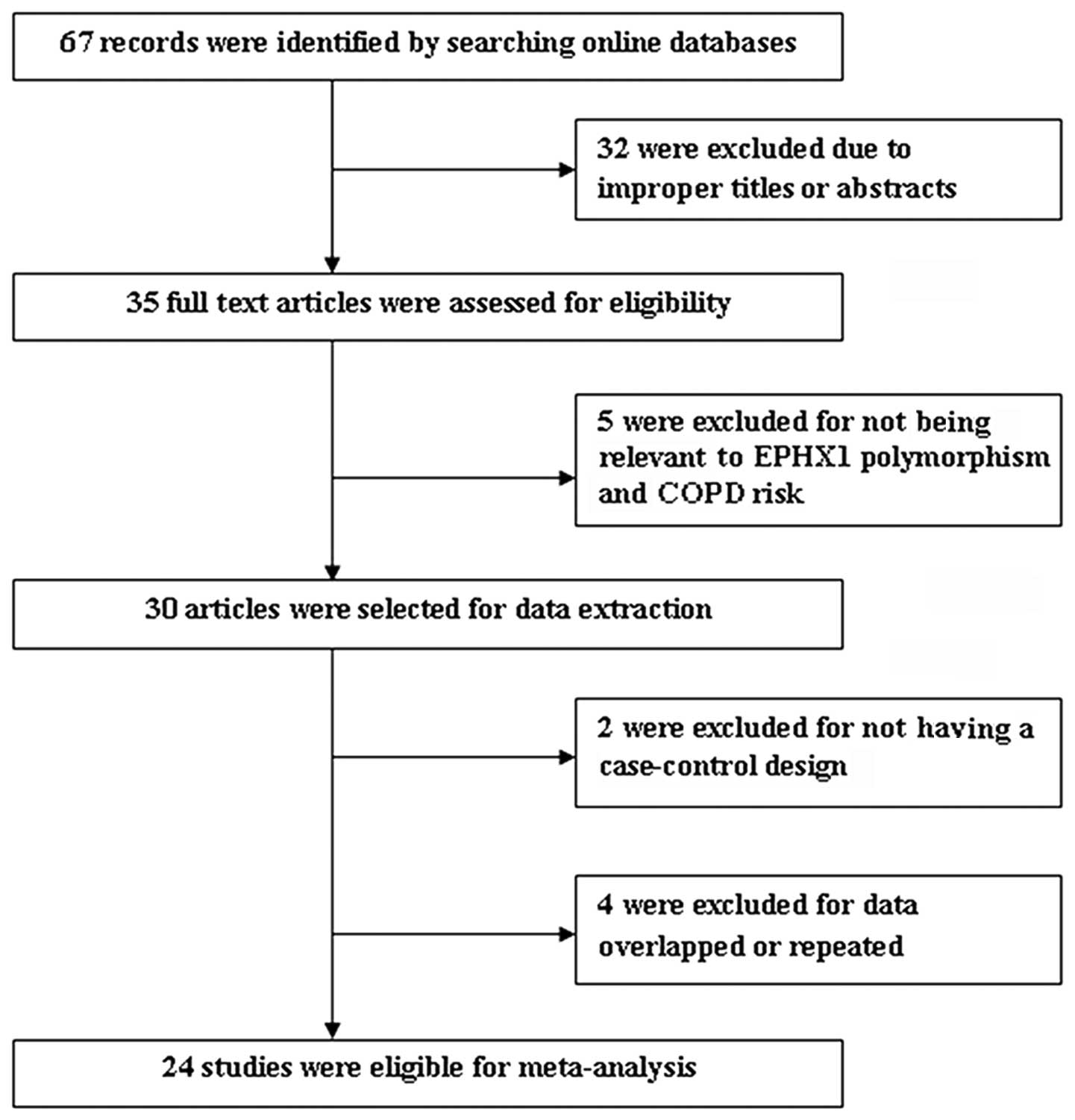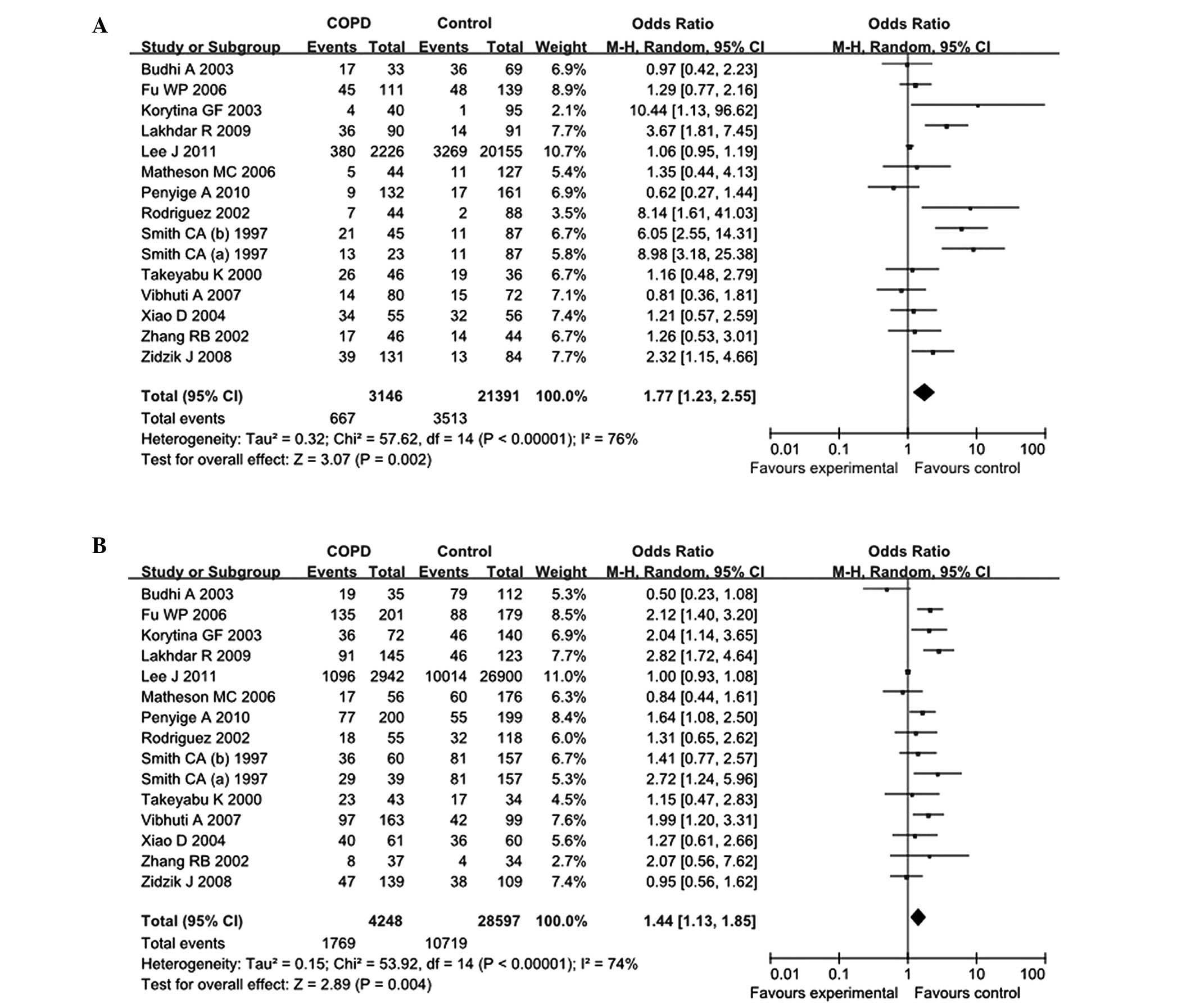|
1
|
Pauwels RA, Buist AS, Calverley PM,
Jenkins CR and Hurd SS; GOLD Scientific Committee: Global strategy
for the diagnosis, management, and prevention of chronic
obstructive pulmonary disease. NHLBI/WHO Global Initiative for
Chronic Obstructive Lung Disease (GOLD) Workshop summary. Am J
Respir Crit Care Med. 163:1256–1276. 2001. View Article : Google Scholar
|
|
2
|
Fabbri L, Caramori G, Beghe B, Papi A and
Ciaccia A: Chronic obstructive pulmonary disease international
guidelines. Curr Opin Pulm Med. 4:76–84. 1998. View Article : Google Scholar : PubMed/NCBI
|
|
3
|
Løkke A, Lange P, Scharling H, Fabricius P
and Vestbo J: Developing COPD: a 25 year follow up study of the
general population. Thorax. 61:935–939. 2006.PubMed/NCBI
|
|
4
|
Silverman EK, Chapman HA, Drazen JM, et
al: Genetic epidemiology of severe, early-onset chronic obstructive
pulmonary disease. Risk to relatives for airflow obstruction and
chronic bronchitis. Am J Respir Crit Care Med. 157:1770–1778. 1998.
View Article : Google Scholar
|
|
5
|
Foreman MG, DeMeo DL, Hersh CP, Reilly JJ
and Silverman EK: Clinical determinants of exacerbations in severe,
early-onset COPD. Eur Respir J. 30:1124–1130. 2007. View Article : Google Scholar : PubMed/NCBI
|
|
6
|
Oesch F, Glatt H and Schmassmann H: The
apparent ubiquity of epoxide hydratase in rat organs. Biochem
Pharmacol. 26:603–607. 1977. View Article : Google Scholar : PubMed/NCBI
|
|
7
|
Omiecinski CJ, Aicher L, Holubkov R and
Checkoway H: Human peripheral lymphocytes as indicators of
microsomal epoxide hydrolase activity in liver and lung.
Pharmacogenetics. 3:150–158. 1993. View Article : Google Scholar : PubMed/NCBI
|
|
8
|
Hassett C, Aicher L, Sidhu JS and
Omiecinski CJ: Human microsomal epoxide hydrolase: genetic
polymorphism and functional expression in vitro of amino acid
variants. Hum Mol Genet. 3:421–428. 1994. View Article : Google Scholar : PubMed/NCBI
|
|
9
|
Smith CA and Harrison DJ: Association
between polymorphism in gene for microsomal epoxide hydrolase and
susceptibility to emphysema. Lancet. 350:630–633. 1997. View Article : Google Scholar : PubMed/NCBI
|
|
10
|
Takeyabu K, Yamaguchi E, Suzuki I,
Nishimura M, Hizawa N and Kamakami Y: Gene polymorphism for
microsomal epoxide hydrolase and susceptibility to emphysema in a
Japanese population. Eur Respir J. 15:891–894. 2000. View Article : Google Scholar : PubMed/NCBI
|
|
11
|
Yim JJ, Park GY, Lee CT, et al: Genetic
susceptibility to chronic obstructive pulmonary disease in Koreans:
combined analysis of polymorphic genotypes for microsomal epoxide
hydrolase and glutathione S-transferase M1 and T1. Thorax.
55:121–125. 2000. View Article : Google Scholar
|
|
12
|
Rodriguez F, Jardi R, Costa X, et al:
Detection of polymorphisms at exons 3 (Tyr113-->His) and 4
(His139-->Arg) of the microsomal epoxide hydrolase gene using
fluorescence PCR method combined with melting curves analysis. Anal
Biochem. 308:120–126. 2002.PubMed/NCBI
|
|
13
|
Korytina GF, Ianbaeva DG and Viktorova TV:
Role of polymorphic variants of cytochrome P450 genes (CYP1A1,
CYP2E1) and microsomal epoxide hydrolase (mEPHX) in pathogenesis of
cystic fibrosis and chronic respiratory tract diseases. Mol Biol
(Mosk). 37:784–792. 2003.(In Russian).
|
|
14
|
Cheng SL, Yu CJ, Chen CJ and Yang PC:
Genetic polymorphism of epoxide hydrolase and glutathione
S-transferase in COPD. Eur Respir J. 23:818–824. 2004. View Article : Google Scholar : PubMed/NCBI
|
|
15
|
Xiao D, Wang C, Du MJ, et al: Relationship
between polymorphisms of genes encoding microsomal epoxide
hydrolase and glutathione S-transferase P1 and chronic obstructive
pulmonary disease. Chin Med J (Engl). 117:661–667. 2004.
|
|
16
|
Hersh CP, Demeo DL, Lange C, et al:
Attempted replication of reported chronic obstructive pulmonary
disease candidate gene associations. Am J Respir Cell Mol Biol.
33:71–78. 2005. View Article : Google Scholar : PubMed/NCBI
|
|
17
|
Brøgger J, Steen VM, Eiken HG, Gulsvik A
and Bakke P: Genetic association between COPD and polymorphisms in
TNF, ADRB2 and EPHX1. Eur Respir J. 27:682–688. 2006.PubMed/NCBI
|
|
18
|
Fu WP, Sun C, Dai LM, Yang LF and Zhang
YP: Relationship between COPD and polymorphisms of HOX-1 and mEPH
in a Chinese population. Oncol Rep. 17:483–488. 2007.PubMed/NCBI
|
|
19
|
Vibhuti A, Arif E, Deepak D, Singh B and
Qadar Pasha MA: Genetic polymorphisms of GSTP1 and mEPHX correlate
with oxidative stress markers and lung function in COPD. Biochem
Biophys Res Commun. 359:136–142. 2007. View Article : Google Scholar : PubMed/NCBI
|
|
20
|
Zhang RB, Zhang AZ, He QY and Lu BB:
Microsomal epoxide hydrolase gene polymorphism and susceptibility
to chronic obstructive pulmonary disease in Han nationality of
North China. Zhonghua Nei Ke Za Zhi. 41:11–14. 2002.(In
Chinese).
|
|
21
|
Zheng Q and Zheng W: The association
between the microsomal epoxide hydrolase gene polymorphism and
host’s susceptibility to COPD. Chin J Prim Med Pham (Chin).
16:1779–1780. 2009.(In Chinese).
|
|
22
|
Zidzik J, Slabá E, Joppa P, et al:
Glutathione S-transferase and microsomal epoxide hydrolase gene
polymorphisms and risk of chronic obstructive pulmonary disease in
Slovak population. Croat Med J. 49:182–191. 2008. View Article : Google Scholar : PubMed/NCBI
|
|
23
|
Chappell S, Daly L, Morgan K, et al:
Genetic variants of microsomal epoxide hydrolase and
glutamate-cysteine ligase in COPD. Eur Respir J. 32:931–937. 2008.
View Article : Google Scholar : PubMed/NCBI
|
|
24
|
Lakhdar R, Denden S, Knani J, et al:
Microsomal epoxide hydrolase gene polymorphisms and susceptibility
to chronic obstructive pulmonary disease in the Tunisian
population. Genet Test Mol Biomarkers. 14:857–863. 2010. View Article : Google Scholar : PubMed/NCBI
|
|
25
|
Penyige A, Poliska S, Csanky E, et al:
Analyses of association between PPAR gamma and EPHX1 polymorphisms
and susceptibility to COPD in a Hungarian cohort, a case-control
study. BMC Med Genet. 11:1522010. View Article : Google Scholar : PubMed/NCBI
|
|
26
|
Lee J, Nordestgaard BG and Dahl M: EPHX1
polymorphisms, COPD and asthma in 47,000 individuals and in
meta-analysis. Eur Respir J. 37:18–25. 2011. View Article : Google Scholar : PubMed/NCBI
|
|
27
|
Chen CZ, Wang RH, Lee CH, Lin CC, Chang HY
and Hsiue TR: Polymorphism of microsomal epoxide hydrolase is
associated with chronic obstructive pulmonary disease and
bronchodilator response. J Formos Med Assoc. 110:685–689. 2011.
View Article : Google Scholar : PubMed/NCBI
|
|
28
|
Budhi A, Hiyama K, Isobe T, et al: Genetic
susceptibility for emphysematous changes of the lung in Japanese.
Int J Mol Med. 11:321–329. 2003.PubMed/NCBI
|
|
29
|
Park JY, Chen L, Wadhwa N and Tockman MS:
Polymorphisms for microsomal epoxide hydrolase and genetic
susceptibility to COPD. Int J Mol Med. 15:443–448. 2005.PubMed/NCBI
|
|
30
|
Yoshikawa M, Hiyama K, Ishioka S, Maeda H,
Maeda A and Yamakido M: Microsomal epoxide hydrolase genotypes and
chronic obstructive pulmonary disease in Japanese. Int J Mol Med.
5:49–53. 2000.PubMed/NCBI
|
|
31
|
Matheson MC, Raven J, Walters EH, Abramson
MJ and Ellis JA: Microsomal epoxide hydrolase is not associated
with COPD in a community-based sample. Hum Biol. 78:705–717. 2006.
View Article : Google Scholar : PubMed/NCBI
|
|
32
|
Park SS, Kim EJ, Son CY, et al: Genetic
polymorphism of epoxide hydrolase and GSTM1 in chronic obstructive
pulmonary disease. Tuberc Respir Dis (Seoul). 55:88–97. 2003.
|
|
33
|
Hu G, Shi Z, Hu J, Zou G, Peng G and Ran
P: Association between polymorphisms of microsomal epoxide
hydrolase and COPD: results from meta-analyses. Respirology.
13:837–850. 2008. View Article : Google Scholar : PubMed/NCBI
|
|
34
|
Cochran WG: The combination of estimates
from different experiments. Biometrics. 10:101–129. 1954.
View Article : Google Scholar
|
|
35
|
Kavvoura FK and Ioannidis JP: Methods for
meta-analysis in genetic association studies: a review of their
potential and pitfalls. Hum Genet. 123:1–14. 2008. View Article : Google Scholar : PubMed/NCBI
|
|
36
|
Colhoun HM, McKeigue PM and Davey Smith G:
Problems of reporting genetic associations with complex outcomes.
Lancet. 361:865–872. 2003. View Article : Google Scholar : PubMed/NCBI
|
|
37
|
Mantel N and Haenszel W: Statistical
aspects of the analysis of data from retrospective studies of
disease. J Natl Cancer Inst. 22:719–748. 1959.PubMed/NCBI
|
|
38
|
DerSimonian R and Laird N: Meta-analysis
in clinical trials. Control Clin Trials. 7:177–188. 1986.
View Article : Google Scholar : PubMed/NCBI
|
|
39
|
Begg CB and Mazumdar M: Operating
characteristics of a rank correlation test for publication bias.
Biometrics. 50:1088–1101. 1994. View Article : Google Scholar : PubMed/NCBI
|
|
40
|
Egger M, Davey Smith G, Schneider M and
Minder C: Bias in meta-analysis detected by a simple, graphical
test. BMJ. 315:629–634. 1997. View Article : Google Scholar : PubMed/NCBI
|
|
41
|
Zhou W, Thurston SW, Liu G, et al: The
interaction between microsomal epoxide hydrolase polymorphisms and
cumulative cigarette smoking in different histological subtypes of
lung cancer. Cancer Epidemiol Biomarkers Prev. 10:461–466.
2001.
|
|
42
|
Maekawa K, Itoda M, Hanioka N, et al:
Non-synonymous single nucleotide alterations in the microsomal
epoxide hydrolase gene and their functional effects. Xenobiotica.
33:277–287. 2003. View Article : Google Scholar : PubMed/NCBI
|
|
43
|
Smolonska J, Wijmenga C, Postma DS and
Boezen HM: Meta-analyses on suspected chronic obstructive pulmonary
disease genes: a summary of 20 years’ research. Am J Respir Crit
Care Med. 180:618–631. 2009.
|


















